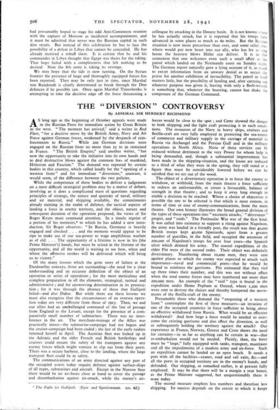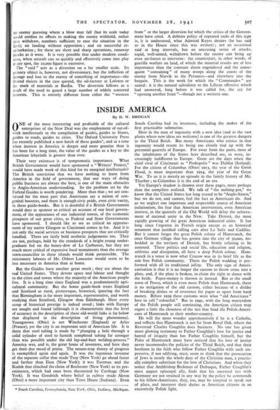THE " DIVERSION " CONTROVERSY
By ADMIRAL SIR HERBERT RICHMOND
AS long ago as the beginning of October appeals were made in the Russian Press for immediate action by Great Britain in the west. "The moment has arrived," said a writer in Red Fleet, " for a decisive move by the British Army, Navy and Air Force against German forces, weakened by the despatch of rein- forcements to Russia." While 200 German divisions were engaged on the Russian front no more than 25 to 3o remained in France. " The British Empires" said another writer, " has now the opportunity to take the initiative into its own hands and to deal destructive blows against the common foes of mankind, Hitlerism and Fascism." The demand was repeated by certain bodies in this country, which called loudly for the " opening of a western front " and for immediate " diversions," unaware, it would seem, of the difference between the two policies.
While the competence of these bodies to deliver a judgement on a most difficult strategical problem may be a matter of debate, involving as it does a complicated mass of questions regarding principles of strategy, the nature and quantity of naval, military and air material, and shipping available, the commitments already existing in the realm of defence, the tactical aspects of landing a force in enemy territory, and the object, nature and consequent duration of tile operation proposed, the views of Sir Roger Keyes must command attention. In a timely reprint of a portion of his memoirs,* to which he has added a new intro- duction, Sir Roger observes: " In Russia, Germany is heavily engaged and checked . . . and the moment would appear to be ripe to make use of our sea-power to wage amphibious warfare as of old. . . . The opportunity of a lifetime is now in his [the Prime Minister's] hands, but must be seized in the lifetime of the opportunity, and all the world is waiting to see how, when and where the offensive strokes will be delivered which will bring us to victory."
Of the many lessons which the grim story of failure at the Dardanelles conveys, three are outstanding—the need for a clear understanding and an accurate definition of the object of an operation or series of operations ; for the most meticulous and complete preparation in all the elements, strategical, tactical and administrative ; and for unswerving determination in its prosecu- tion ; for it was through the absence of these that Gallipoli failed—and also Dakar. But while there are these lessons we must also recognise that the circumstances of an oversea opera- tion today are very different from those of 1915. Then, we and our allies had an unchallenged command of the line of passage from England to the Levant, except for the presence of a com- paratively small number of submarines. There was no inter- ference in the air. The merchant-tonnage of the Allies was practically intact—the submarine-campaign had not begun and the cruiser-campaign had been ended ; the last of the early raiders interned herself in April. The Austrian fleet was locked up in the Adriatic and the older French and British battleships and cruisers could ensure the safety of the transports against any enemy forces which might venture to slip out from their ports. There was a secure harbour, close to the landing, where the large transport fleet could lie in safety.
The communications of an army directed against any part of the occupied coasts today require defence against surface-ships of all types, submarines and aircraft. Except in the Narrow Seas there would be no air-bases close at hand to cover the passage and disembarkation against air-attack, while the enemy's air-
* The Fight for Gallipoli. (Eyre and Spottiswoode. 125. 6d.) forces would be close to the spot ; and Crete showed the danger to both shipping and the light craft protecting it in such condi- tions. The resources of the Navy in heavy ships, cruisers and flotilla-craft are very fully employed in protecting the sea-routes of commerce and military supply in the carriage of material to Russia via Archangel and the Persian Gulf and in the military operations in North Africa. None of these services can be reduced without detriment to the very POwer for whom help is being demanded, and, though a substantial improvement has been made in the shipping-situation, and the losses are reduced to a third of what they were in the spring, they still stand at a figure that must be considerably lowered before we can be satisfied that we are out of the wood.
The object of a diversionary operation is to force the enemy to withdraw, or withhold, from the main theatre a force sufficient to redress an unfavourable, or create a favourable, balance of strength in that theatre ; and to keep it away long enough to enable a decision to be reached. Where a choice of objectives is possible the one to be selected is that which is most remote, in terms of time or ease of enemy-communications, from the main theatre. Our own history illustrates the broad general division of the types of these operations into " excentric attacks," " diversions " proper, and " raids." The Peninsular War was of the first kind. It was called into existence to support a rising against Napoleon, the army was landed in a friendly port, the result was that 40,000 British troops kept 40,000 Spaniards, apart from a greater number of guerillas, in the field, and occupied the attention of 200,000 of Napoleon's troops for over four years—the Spanish ulcer which drained his army. The coastal expeditions of the elder Pitt were of the second order. Their object was definitely diversionary. Numbering about to,000 men, they were sent against places to which the enemy was expected to attach such importance—naval and commercial ports—that he would be bound to reinforce the garrisons. Pitt estimated that they tied up three times their number, and this was not without effect when the total enemy forces may have numbered not more than 200,000 men. An example of the " raid " type is found in the expedition under Home Popham at Ostend, where 1,200 men were sent to destroy the sluices and thereby hampered the move- ments of the flotilla-craft of the enemy.
Presumably those who demand the "reopening of a western front " contemplate the first of these measures—an invasion of one of the occupied countries in force sufficient to bring_about an effective withdrawal from Russia. What would be an effective withdrawal? And how large a force would be needed to over- come the existing garrisons and also effect the diversion, as well as subsequently holding the territory against the attack? Our experience in France, Norway, Greece and Crete shows the need for certainty—in so far as anything can be certain in war—that re-embarkation would not be needed. Plainly, then, the force must be " large," fully equipped with tanks, transport, munitions and all the impedimenta of a modern army and air-force. Such an expedition cannot be landed on an open beach. It needs a port with all the facilities—cranes, road and rail exits, &c.—and all the ports in occupied territory are in the enemy's hands, and defended. Our shipping, as remarked earlier, is at present fully employed. It may be that there will be a margin a year hence, as the Prime Minister suggested, but unquestionably there is none today.
The second measure employs less numbers and therefore less shipping. Its success depends on the extent to which it keeps the enemy guessing where a blow may fall (but its scale today would confine its effects to making the enemy withhold, rather than withdraw, numbers sufficient to ease the situation in the East); on landing without opposition ; and on successful re- embarkation ; for these are short and sharp operations, runaway knocks as it were. It is very possible that under modern condi- tions, when aircraft can so quickly and effectively come into play at any spot, the to,000 figure is excessive.
The " raid " acts as a diversion on a far smaller scale. Its primary object is, however, not diversionary, but the infliction of damage and loss to the enemy of something of importance—the Ostend sluices in the case quoted, the oil-factory at Lofoten or the stock of materials at Bardia. The diversion follows as a result of the need to guard a large number of widely scattered interests. This is entirely different from either the "western front " or the larger diversion for which the critics of the Govern- ment have cried. A definite policy of repeated raids of this type is, it is understood, what Admiral Keyes desires (he has said so in the House since this was written) ; not an occasional raid at long intervals, but an unceasing series of attacks, rapid, well-aimed, withdrawn before the enemy can bring up even air-forces to intervene : the counterpart, in other words, of guerilla warfare on land, of which the material results are of less importance than the constant alarm engendered and the conse- quent " containing " of many troops along the coasts of the enemy from Narvik to the Pyrenees—and elsewhere into the bargain. This is the work for which the " Commandos " are suited : it is the natural subsidiary to the Libyan offensive which had answered,. long before it was called for, the cry for " opening another front "—though not a western one.



























 Previous page
Previous page